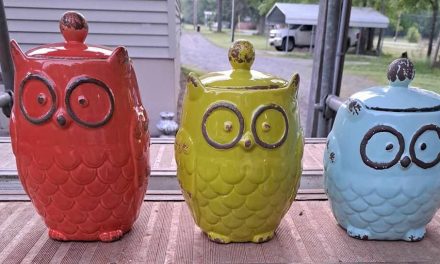
by Ariel Roberson, ShrevePossible
The Krewe of Highland, known for its philanthropy, its ridiculousness and, when it comes to bals, its debauchery The Krewe has a fascinating history and a founder who is full of the Mardi Gras spirit. From being a young man with long, flowing brown hair to an older man with short, silver locks, Matthew Linn has quite a story to share about 30 years of the Krewe of Highland.
What city were you in prior to returning to Louisiana?
Tallahassee, Florida.
Why Tallahassee?
I was 19. I lived (in Shreveport) as a child. I’m a military brat. I was born on Barksdale Air Force Base. We moved to Baton Rouge for six years when I was a child. We came back and worked for a family business that my siblings and I were running. My father passed away when I was 19. I needed to get out of the family business, because I had siblings that were there.
The pie wasn’t big enough. Pies only have so many slices. I was the youngest, so I needed to leave. And I left. I went to North Carolina, and I lived there for a year and just tried to get my stuff together. I lived there for a year, got my act together and went to Tallahassee.
When I moved to Tallahassee, I got the job that I always wanted as a child. As a child, I’d had this dream job, and I was able to get it. I was the youngest person in corporate history for General Parts Incorporated to ever be a regional sales manager. So I covered sales for the southern half of Georgia, the panhandle of Florida and the tip of Alabama. I sold to auto parts stores, which is what I did here. I just worked in the stores for my father. And so I did that for about eight years. Then we got bought out about six years into it. The company that bought us asked us to do some things that I didn’t think were ethically correct. And so I quit. And after I quit, I didn’t know what to do. So I came home.
And you ran for Caddo Commissioner?
I did that. I ran for Caddo Commissioner three times and won three times. So I was term-limited after 12 years.
What prompted the run for Caddo Commissioner?
Living in Shreveport, I saw some things. I was trying to steer the community into a more open-minded way of operating that was also more business friendly but also took greater function with education, raising youth and teaching people alternative ways. I wasn’t having as much success as I would’ve liked, so I said, “Well, I’ll just run for office.” I felt like I had great success as an elected official.

And at what point did you begin the Krewe of Highland?
The Krewe of Highland has been in function for almost 30 years and a nonprofit in good standing with the state of Louisiana. We incorporated at the suggestion of Marsha Millican. She’s a CPA in Shreveport who does a lot of nonprofit work. She is the CPA or the treasurer for Highland Area Partnership, now Highland Restoration, Highland Neighborhood Association and several other different entities. She gives back tremendously. She said that she saw great potential in the Krewe of Highland. So she wanted us to incorporate as a nonprofit. Prior to that, we were under the two nonprofits, and we were rapidly outgrowing those two nonprofits.
How has your role with local government influenced the Krewe?
When I moved back to Shreveport, I had never owned a house. The price of housing here was incredibly affordable, which it is still. So, I bought a triplex. I bought it under the Resolution Trust Corporation, which was a government auction.
I didn’t have any money to buy it, and I didn’t have any money to repair it. I just bought a book on how to repair homes and read the book and then borrowed some tools from people. My first power saw I borrowed from Sam Albert, who lived across the street from me growing up. He had gotten older and wasn’t using his tools as much, so he let me borrow a lot of his tools. I started remodeling this house and then rented out the only one that was rentable. I then fixed up the one I lived in and moved out of it and moved into the other one that was not livable and fixed it up.
And then I had two rented. I was able to save enough money, bought another house with the down payment, and I was leveraged. I’m still leveraged, so one house pays for the next house. So I started remodeling homes in Highland. And the houses are fantastic. They’re very easy to fix up. In the process of remodeling the houses, I got involved in local government, because I had to get permits and permission. I got to know everybody and then got to know elected officials and then became a member of the neighborhood association. Since I was young and fixing up houses, they wanted me to be on their board. So I got on the board. I got to know lots of local elected officials.
So that I don’t know if I answered your question, what was your question? I go down the rabbit hole.
So how has local government influenced the Krewe of Highland?
The Krewe of Highland is a partnership with the City of Shreveport primarily, and so we rent the streets from the City of Shreveport. So we follow the rules that the City of Shreveport gives us in order to operate the Krewe of Highland. We function on the Sunday before Fat Tuesday. We do that because we know that it’s easier to keep a person in town than it is to get a person here. So we’ll let the bigger group get somebody here. But then we’ll keep them here. And for every hour that you’re able to keep a person in the city on a tourist dollar, the city makes money. So our goal was to help the city with taxes, bringing in outside money, and to also provide customers for local businesses. Also, to bring people into the Highland neighborhood to see the neighborhood in a day full of wonder, which is in our by-laws that you have neighbors that are outside their homes. They might have seen their neighbor, but they’ve never spoken with their neighbor, and so they visit with their neighbor. They get to know their neighbors, and people become friendlier, and then you have visitors that come in and they go, “Wow, I can buy this house for $20 a square foot, and I’m able to get way more house for the dollar than anywhere else. And I can buy a house and own a house and build equity in a house for less money than it cost to rent houses in a good neighborhood”
Do you think that this has ensured the Krewe of Highland’s place in the history of Shreveport Mardi Gras?
Yes. I mean, it has already happened. So there are people moving to Highland because of the housing stock and moving to Highland because of the Krewe of Highland Mardi Gras parade, and people buying houses on the parade route. Because they want to be on the parade route. And people invite their family and friends to the city to go to the parade, to be a participant in the parade. And local companies, small companies, being in the parade so that they can throw their wares to get the message out for their businesses. And so, yes, the Krewe of Highland is ingrained in the City of Shreveport. And in Shreveport Mardi Gras.
How do you retain momentum throughout the year to keep the Krewe of Highland in the forefront?
We don’t. I guess the Krewe operates most efficiently as a one-hit wonder. That being said, we have our Mardi Gras bal on Friday. We recover on Saturday, and we have our parade on Sunday. It’s contained within that. The royalty over the years have wanted to do more. We do other things that the royalty wants to do. And we let the royalty be the front of the house. Imagine us as a theater. A theater has its front of the house, the head actor, the head actress, the king of Mardi Gras, the queen, the person that’s the director, which would be your captain. And then it has the back of the house, which would be your lighting and your producers and your pure function. The Krewe of Highland very much operates in that fashion.
Marsha Millican, the CPA for the Krewe, she’s been the Queen, she’s been the captain and her husband has been the king or residence the captain. I’ve been the captain for the first seven years or so. Chuck Reed has been involved with the krewe. So we’ve all moved from the front of the house to the back of the house, because you can’t party the way that the king and the queen and the captain and the royalty have to party. It’s a lot of getting out every single night and you know they go to nursing homes, they go to elementary schools, they go to everybody else’s bal. They send representatives from their bals to other events. It’s a lot of giving, it’s a lot of work.
It would be impossible for the same group to do it year after year after year. So we have the front of the house, which is the king and the queen, who pick their royalty with the family and the friends and the people around them. And then the captain is the one person who can do it more than one year in a row, because it’s so much work and so much to learn. You can’t just teach somebody that every year. So the captain has to educate the next captain. The captain can’t leave their post until they found someone who’s capable of assuming the role that they have, which is coordinating all of these events and informing the king and the queen of all their duties – bringing them up to speed, we’ve got this Friday night, we’ve got this Saturday night, we’ve got this Sunday, Tuesday morning. Who can take off work to go to this nursing home to visit with the people that live there? Who can go to Caddo Community Action Agency, to the headstart programs on Friday morning? Who can take off work to do this? So, there’s a lot of work that goes into that. The back of the house, we do a lot of coordination, that is over a multi-year aspect. We just partnered with Boy Scout troop 15, with Shreveport Green with a lot of other entities and we planted 300 fruit trees in Highland Park. That’s not something that happens in a Mardi Gras season. That’s something that we’ve worked with Caddo Parish Commissioner John Paul Young for three years to do. So it’s a back-of-the-house function more than a front-of-the-house function. We’re redoing all of the neutral grounds and medians.
But it’s still representative of the Krewe of Highlands values?
Oh, absolutely. Yes. Our values are in our by-laws.
In our bylaws is where we are a certified nonprofit. We have a board of directors. We vote every year. We vote on the money that is being spent, we vote on the nonprofit functions that we support. We vote on areas to help Highland. Granted, 100% of our focus is on the Highland area. And just this year, we just barely moved outside to do the parade route and neighborhoods the parade route effects.
How does the Krewe of Highland influence other smaller krewes?
I think we give them spirit and influence. I’ve had other krewes that have called me. Or people that have called me that wanted to start a krewe. I’ve shared our bylaws with other krewes. I’ve had several other krewes call and ask about the difficulties that we have, and how do we overcome them and what we suggest that they do to be better.
You have a good heart, and you give as much as you can give. You know that sometimes you have to say no. You can’t be in two places at one time.
You have a limited amount of expenditures. And so sometimes you do have to say no, but you give back to the community, and you represent the values that you have the best that you can.
What’s been your favorite costume?
I’ve done a lot. So, I used to own a restaurant. Prior to opening up the restaurant, I had really long hair, my hair went down to my waist. When you own a restaurant, long hair and restaurants don’t go very well together. And so the year that the restaurant was going to actually open I shaved my head and gave my hair to Locks of Love.
And then I latexed my body and painted myself silver. I went as a person from the future. That was memorable and fun.
Mad as a March Hare was our theme one year. That year, the Mardi Gras was a lunar holiday. So, Mardi Gras fell in March that year. And so our theme chosen by Cara Derek was “Mad as a March Hare” so I was the Mad Hatter. And that was a good costume.
But a lot of my costumes disappear. Things come to me and things go. I accept the flow as things, like my hat disappeared and things that I had disappeared. But as things disappear, you let them go and then new things appear.
What’s your favorite Krewe?
There’s a lot of them. We have a very close relationship with the Krewe of Harambee. We have a very close relationship with Justinian. So, Justinian has been a strong partner with the Krewe of Highland, and, of course, there’s a lot of people that rent floats from Centaur that put them in the parade, and that helps
Asclepius when they were the medical krewe, when they started, they were a lot of a lot of help to us. They really helped out the Krewe of Highland and Apollo. There used to be a Krewe of Apollo and there used to be a Krewe of Asclepius. Both of them have dissolved. But both of those krewes were very active when we started. And both of those krewes helped us a lot. Without that we would not be nearly as successful as we are.
I would have to say that Mardi Gras in northwest Louisiana has done more for relationship building than anything that this community has ever had. You have groups of people who are friends with each other, but they’re working within a bubble. Then that’s a krewe. And then you have other krewes working in their bubble and their group of friends. These events that we have bring everybody together for an event that otherwise we would never be in the same room together.
It puts people at the same table, breaking bread with each other, getting to know each other and talking to each other. Without Mardi Gras in northwest Louisiana, none of that would happen, at least not to the extent at which Mardi Gras fosters it. Mardi Gras fosters goodwill amongst people that otherwise would never even really get to know each other.
What is the strangest thing that has been thrown from a Highland Float?
This isn’t the strangest, but I will tell you a story about the Krewe of Highland in its third year. My job is that I’m at the beginning of the parade. All of the people that are in the parade, I look and see everybody that’s in the parade. I know everybody that’s in the parade. I’ve met with everybody that’s in the parade. I know what everybody in the parade is throwing… for the most part.
It was probably our fourth parade, and I’m the mixmaster at the front of the parade. So we pull from several different streets. So we’ll have big floats, small floats, marching bands, and you don’t want to put a marching band, next to, in front of, or behind a float that has really, really loud music because it drowns out the sound of the marching band. They fight each other for sound. So you want to put the marching band in front of somebody that doesn’t have any music, and then the marching band does their music.
So I know everything that’s going on. So I’m also the last float, because after everybody goes, I bring up the rear. Okay. In doing that, I noticed people eating hot dogs one year, this is like our fourth year. I asked “Where’d all these hot dogs come from?” They’re like, “Well, the hot dog float threw it.” And I said, “We don’t have a hot dog float.”
And whomever said, “(it came from) a hot dog float threw it. And yes, you do have a hot dog float.” I said, “Well, that’s really odd.”
So the fifth year I’ve been looking everywhere to see if anybody has any hot dogs to the point of going through and looking in ice chests. I didn’t see any hot dogs. As soon as I start rolling, I see hot dogs, people eating hot dogs everywhere.
Where are these hot dogs coming from? And then everybody tells me, “The hot dog float threw it.”
So… who is the hot dog float? Who? Who and they’re like, “We don’t know, we don’t need to know who the hot dog float is.”
The six year rolls, and I’m just on a mission. I’m going to go through everybody trying to figure out who’s got it. Who’s got it? And then I’m like calling people on the phone. Do you have hot dogs? No, we don’t have any. Do you know who has a hot dog? No, we don’t know who has the hot dogs. On and on and year six rolls around – more hot dogs than ever. As soon as we’re rolling. I see hot dogs everywhere.
Not long after the sixth year, I’m just at a party. I overheard this person talking about their friends that they work that have the company down the hall that throw the hotdogs at us.
I stop. I start listening. I think I know who’s talking. I know who they are. I know their name. It was Jane Birmingham. And she worked at Par Minerals in what was originally the Commercial National Bank building. Now it’s a Red River Bank building. And she worked there and she starts talking about these hot dogs. I was like, “Well, who is it that throws these hot dogs.” and she’s like, “Jeff Clark that owns Clark Energy. He’s just down the hall from me. He throws these hot dogs. He’s been throwing them every year.”
They had been keeping it a secret from me, but it got out.
I go up to his office and knock on his door. I said, “You’re Jeff Clark, huh?” and it was Jeff Clark, John Head, who was friends of our family, Robert Head, who was friends of our family, and then, of course, there’s David Clark, who’s Jeff Clark’s brother. And they all work there. And it was like a fun practical joke.
So I ask, “So you’ve been sneaking into this parade every year?” And he’s like, “Yeah, we do it. We come in off of a Dalzell, and then honk the horn until they move out of the way and then we just push out right in the middle of the parade right toward the front of it. As soon as we see the parade coming. We just bust into it and start throwing. We’ve been making hot dogs. At 2 a.m., we boil water, preheat the ice chests, get them all warm. We cook all those hot dogs, and we were throwing 3,000.”
Now they throw like 6-8000 hotdogs at the parade.
“We cook them all with condiments. We wrap them up, and we throw them. Yeah, we’ve been doing that.”
And I’m like, “Well, because you have shown the true Mardi Gras spirit. We’d like for you to be king number seven, in the parade.”
And so Jeff was King number seven.
He’s like, “This is the greatest day of my life.”
He was so happy.
The Krewe of Highland is able to operate with the generosity of people like Jeff Clark, and that allows us to pay Byrd’s marching band to begin the parade. It allows us to allow the Renzi Center in the parade free. It allows us to operate in a fashion where people that have a lot to give that want to be in the parade, but they don’t have a lot of money.
Chuck Reed who was in the very first parade, his daughter has been on the board of directors. And so it has been handed down generation to generation.
Where it started off as you know, a young man with long dark hair now I’m an older man with silver hair. Everything has changed. But I’d like to think that we still have the same spirit that we have. They still throw hot dogs, which is our trademark.
So what does the future hold with the Krewe of Highland?
Well, we continue to give back to the neighborhood we can we will every year we will give something back to the neighborhood this past Saturday, we planted 300 mature fruit trees in Highland Park in partnership with Boy Scout Troop 15 and several other nonprofit entities and probably 100 volunteers, it was easy because of all the volunteers. The trees that we planted were six feet tall, and so the majority of them will produce fruit this coming summer. And because these 300 fruit trees are in a public park, they’re free for anybody who wants to eat for free.
They say money doesn’t grow on trees. But if you’ve gone to the grocery store and tried to buy fresh fruit, it’s expensive. Now people can walk through the park and eat for free from here on.
The Krewe of Highland Bal is 7 p.m. Feb. 9 at Phoenix 2.0, 400 Commerce St. in downtown Shreveport. The parade is 2 p.m. Feb. 11. For more information, visit https://kreweofhighland.org/.








